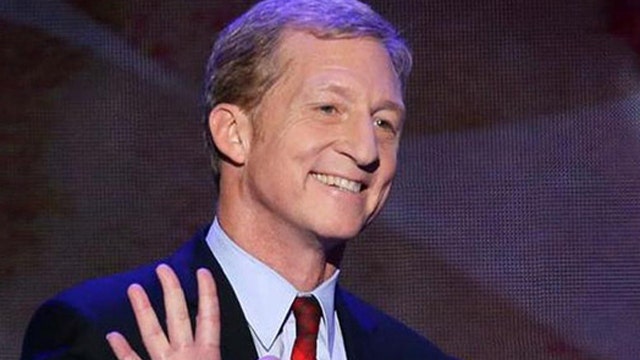Liberal billionaire Tom Steyer's bizarre ads need fact check
Steven Moore and Joe Lestingi on whether his ads will make a difference this year, or just fizzle
Billionaire liberal activist Tom Steyer is dumping millions into campaign ads this year, attacking Republican lawmakers he deems unfriendly to the environment.
But Steyer's colorful and sometimes bizarre advertisements -- the latest of which shows Iowa Republican Senate candidate Joni Ernst in the pocket of creepy cigar-chomping business tycoons -- are drawing mixed reviews.
"These ads are the political equivalent of Miley Cyrus' 'twerking.' Light on substance, heavy on camp and self-indulgence. Kind of what you'd expect from a 'look at me' billionaire like Steyer," charges Pete Snyder, former head of New Media Strategies and current CEO of Northern Virginia-based venture capital firm, Disruptor Capital.
But Steyer, an environmentalist and longtime Democratic activist -- who according to The New York Times accumulated $1.5 billion in personal wealth during his former career as a hedge fund manager -- says he is happy to wield his vast fortune to attack climate change naysayers. A well-funded media blitz is the best weapon in the arsenal, his supporters say. This was the idea behind his $100 million NextGen Climate super PAC campaign announced in May.
In the campaign's early sights: Govs. Rick Scott of Florida, Paul LePage of Maine and Tom Corbett of Pennsylvania, as well as GOP Senate candidates Cory Gardner in Colorado, Joni Ernst in Iowa, Terri Lynn Land in Michigan and Scott Brown in New Hampshire.
"Our goal is very clear -- to impact the politics as it relates to climate change," Chris Lehane, Steyer's political adviser, told reporters during NextGen Climate's unveiling.
Steyer says he will invest $50 million of his own cash and help raise the rest. The group is hoping to compete with billionaire industrialists and conservative philanthropists, Charles and David Koch, who in January announced the formation of a new super PAC, Freedom Partners Action Fund, which aims to spend more than $15 million in the 2014 midterm campaigns and $290 million overall to support free market, conservative candidates. The related Americans for Prosperity plans to spend $125 million this year and already has run ads against Democrats who support ObamaCare.
Steyer, like the Kochs, is no stranger to political campaigns -- he even spoke at the 2012 Democratic National Convention and reportedly spent $11 million for Terry McAuliffe's successful gubernatorial bid in Virginia last year. But lately his ads have been drawing fire from Republicans, not only for their over-the-top caricatures, but their questionable accuracy.
The Ernst ad, for example, suggests signing an Americans for Tax Reform pledge -- against tax hikes -- is akin to supporting corporate outsourcing of American jobs overseas. In its own review of the ad this month, the fact-checking group Polifact.com called that "false."
On a pair of ads accusing Gov. Scott of gleaning campaign funds from corporate polluters and energy interests that stiff customers, Polifact said their assertions were "half true" and posed questionable leaps of logic.
Scott, who is facing a challenge from former Gov. Charlie Crist, presuming Crist wins the Democratic primary, was so mad at the polluter ad that he had his lawyer get a cease-and-desist order against it at a local Fort Myers television station. The ad was pulled.
This wasn't the first time. A Steyer-funded ad designed to attack the XL Pipeline project in 2013 was abruptly pulled before it aired on a local NBC affiliate. The ad starred an apparent parody of a giddy Russ Girling, CEO of TransCanada, sliding down the pipeline like a playground slide, yelling "yippee!"
NBC said it violated its guidelines, which find any "attack of a personal nature, a direct attack on an individual business or a comment on a private dispute," unacceptable for airing.
But the attempt at satirical humor is obvious in the Steyer-funded bits, which aren't all anti-Republican, like the 2013 attack ad against Democrat Steve Lynch. It featured a parade of "big oil" barons, including another caricature of Russ Girling, saying Lynch had a big heart -- "full of oil." Lynch lost his 2013 primary for U.S. Senate against Rep. Ed Markey in Massachusetts.
"In this day and age you have to be over-the-top to get the attention. There's a blizzard of ads in the world and if no one even looks at yours, they'll never get the substance of your message," said Bill Scher, senior writer for Campaign for America's Future, a progressive nonprofit based in Washington.
Plus, "people's sensitivities have changed over time. There is a higher tolerance for over-the-top right now," he added. "Let's all be big boys and girls and realize that people who have money are going to spend money on political ads -- that's just the way of the world."
But are they effective? Do these ads matter?
"The truth is voters aren't really fact checking these things and that is a problem," said Joe Lestingi, senior political strategist with The Chadderdon Group. "They watch the 30-second ad and get on with their life, but the impression is still there. So I do think these ads will matter, just like the Koch brothers ads will matter in the states they play in."
Snyder disagrees. "These ads might be helpful in raising Steyer's name ID -- his obvious but unstated goal -- but will have little to no impact aiding the candidates he claims to want to help."













































